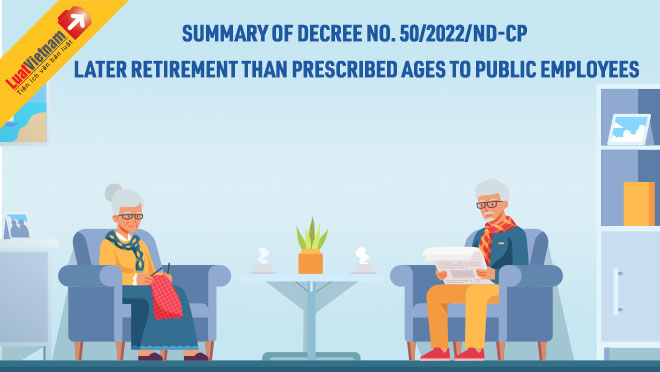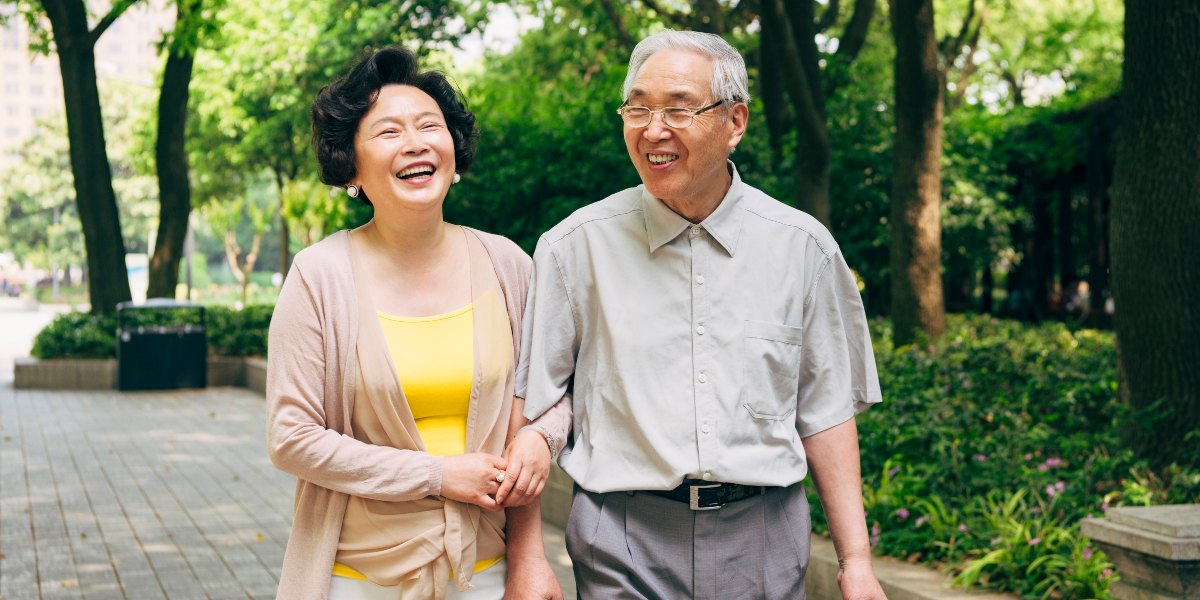DECREE
Providing regulations on retirement later than the prescribed retirement ages applicable to public employees in public non-business units
___________
Pursuant to the Law on Organization of the Government dated June 19, 2015; the Law Amending and Supplementing a Number of Articles of the Law on Organization of the Government and the Law on Organization of Local Administration dated November 22, 2019;
Pursuant to the Labor Code dated November 20, 2019;
Pursuant to the Law on Public Employees dated November 15, 2010, and the Law Amending and Supplementing a Number of Articles of the Law on Cadres and Civil Servants and Law on Public Employees, dated November 25, 2019;
At the proposal of the Minister of Home Affairs;
The Government hereby promulgates the Decree providing regulations on retirement later than the prescribed retirement ages applicable to public employees in public non-business units.
Chapter I
GENERAL PROVISIONS
Article 1. Scope of regulation
This Decree provides regulations on retirement later than the prescribed retirement ages applicable to public employees possessing high professional and technical qualifications in public non-business units and public employees working in a number of special non-business fields.
Article 2. Subjects of application
This Decree applies to:
1. Public employees holding the titles of professor and associate professor;
2. Public employees holding the professional titles requiring a standard degree of doctoral degree or level 2 specialty;
3. Forensic medicine and psychiatrically forensic medicine experts;
4. Public employees possessing high professional and technical qualifications in a number of special non-business fields in accordance with specialized laws.
Chapter II
SPECIFIC PROVISIONS
Article 3. Principles of implementation of the retirement later than the prescribed retirement ages
1. Ensuring objectivity, equity and publicity according to regulations.
2. Public employees may retire up to 5 years (60 months) later than their retirement ages as specified in the Government’s Decree No. 135/2020/ND-CP dated November 18, 2020, prescribing retirement ages.
3. While implementing the retirement later than the prescribed retirement ages, public employees may only perform professional tasks without holding leadership or manager titles, and are not allowed to reserve allowances for leadership positions.
4. While implementing the retirement later than the prescribed retirement ages, if public employees wish to stop working or the non-business units are no longer in need, the pension regime shall be settled in accordance with law provisions.
Article 4. Conditions, order and procedures for considering and deciding on public employees’ retirement later than the prescribed ages
1. Public employees fully satisfying the following conditions may retire later than the prescribed ages:
a) Public non-business units are in need;
b) Being physically fit;
c) Not being in the period of considering for being disciplined; put under investigation, prosecuted or brought to trial or being subject to Government party discipline, and having a written request for extension of working period.
2. Order and procedures for considering and extending the working period:
a) On an annual basis, public non-business units shall, based on their development orientations and human resources, and requirements for the working positions, notify the policy and demand for extension of the working period;
b) Public employees meeting prescribed conditions shall send the written request for working period extension to the authority competent to decide on extension according to the management decentralization at least 6 months before the retirement date;
c) The competent authority according to the management decentralization shall review and evaluate the conditions of public employees wishing to extend the working period, and policy and demand of the public non-business units in order to consider and decide on extending the working period, and the extended period for each specific case;
d) The decision on extending the public employee's working period shall be sent to relevant organizations and individuals at least 3 months before the retirement date.
Article 5. Regimes and policies applicable to public employees retiring later than the prescribed ages
1. Being identified as public employees in the total number of employees assigned by the competent authorities for the non-business units.
2. Being entitled to a salary regime according to the current professional title hierarchy, and other regimes and policies in accordance with law provisions.
Chapter III
IMPLEMENTATION PROVISIONS
Article 6. Effect
1. This Decree takes effect on August 15, 2022.
2. From the effective date of this Decree, the following articles shall cease to be effective:
a) Article 9 of the Government’s Decree No. 141/2013/ND-CP dated October 24, 2013, detailing and guiding the implementation of a number of articles of the Law on Higher Education;
b) Article 9 of the Government's Decree No. 40/2014/ND-CP dated May 12, 2014, prescribing the employment and preferential treatment of scientists and technologists.
Article 7. Transitional provisions
Public employees holding the lecturer titles of public higher education institutions or public employees holding science or technology job titles at public science and technology organizations who have their working period extended under Article 9 of the Government's Decree No. 141/2013/ND-CP dated October 24, 2013, detailing and guiding the implementation of a number of articles of the Law on Higher Education, or Article 9 of the Government's Decree No. 40/2014/ND-CP dated May 12, 2014, prescribing the employment and preferential treatment of scientists and technologists, before the effective date of this Decree shall continue complying with Decree No. 141/2013/ND-CP and Decree No. 40/2014/ND-CP.
Article 8. Responsibility of implementation
Ministers, heads of ministerial-level agencies, heads of government-attached agencies, chairpersons of People’s Committees of provinces and centrally-run cities, and related organizations and individuals shall be responsible for the implementation of this Decree.


 Decree 50/2022/NĐ-CP PDF (Original)
Decree 50/2022/NĐ-CP PDF (Original) Decree 50/2022/NĐ-CP DOC (Word)
Decree 50/2022/NĐ-CP DOC (Word)





